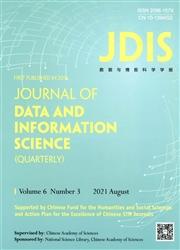超越作者身份:分析 PLOS ONE 中的贡献以及适当署名所面临的挑战
IF 1.5
3区 管理学
Q2 INFORMATION SCIENCE & LIBRARY SCIENCE
引用次数: 0
摘要
目的 本研究旨在评估科学出版物中作者署名的准确性,重点关注学术著作中个人贡献的公平性和准确性。设计/方法/途径 本研究分析了《PLOS ONE》期刊中的 81823 篇出版物,时间跨度为 2018 年 1 月至 2023 年 6 月。研究考察了这些出版物中的作者署名,试图确定不当作者署名的普遍性。研究还调查了受影响作者的人口统计学和专业概况,探讨了导致作者署名不准确的趋势和潜在因素。研究结果 令人惊讶的是,9.14%的文章至少有一位作者署名不当,影响人数超过 14,000 人(占样本的 2.56%)。作者署名不当的情况主要集中在亚洲、非洲和特定的欧洲国家,如意大利。发表过大量论文的知名研究人员以及隶属于公司或非营利组织的研究人员显示出较高的潜在货币作者身份。研究局限性 我们的研究结果基于作者申报的贡献,这意味着对作者的透明度有一定程度的信任。然而,这种对自我报告的依赖可能会给数据集带来偏差或误差。进一步的研究可以采用更多的验证方法来提高研究结果的可靠性。实际意义 这些发现对期刊出版商有重大影响,强调了建立健全的控制机制以确保作者署名完整性的必要性。此外,研究人员在决定何时承认投稿人以及何时将其纳入作者列表时必须保持谨慎。解决这些问题对于维护学术出版物的可信度和公正性至关重要。原创性/价值 本研究有助于人们了解学术著作中的关键问题,揭示不当作者署名的普遍性和影响。本研究呼吁采取细致入微的方法,确保准确归功于作者,从而强调了在学术出版中坚持道德标准的重要性。本文章由计算机程序翻译,如有差异,请以英文原文为准。
Beyond authorship: Analyzing contributions in PLOS ONE and the challenges of appropriate attribution
Purpose This study aims to evaluate the accuracy of authorship attributions in scientific publications, focusing on the fairness and precision of individual contributions within academic works. Design/methodology/approach The study analyzes 81,823 publications from the journal PLOS ONE , covering the period from January 2018 to June 2023. It examines the authorship attributions within these publications to try and determine the prevalence of inappropriate authorship. It also investigates the demographic and professional profiles of affected authors, exploring trends and potential factors contributing to inaccuracies in authorship. Findings Surprisingly, 9.14% of articles feature at least one author with inappropriate authorship, affecting over 14,000 individuals (2.56% of the sample). Inappropriate authorship is more concentrated in Asia, Africa, and specific European countries like Italy. Established researchers with significant publication records and those affiliated with companies or nonprofits show higher instances of potential monetary authorship. Research limitations Our findings are based on contributions as declared by the authors, which implies a degree of trust in their transparency. However, this reliance on self-reporting may introduce biases or inaccuracies into the dataset. Further research could employ additional verification methods to enhance the reliability of the findings. Practical implications These findings have significant implications for journal publishers, highlighting the necessity for robust control mechanisms to ensure the integrity of authorship attributions. Moreover, researchers must exercise discernment in determining when to acknowledge a contributor and when to include them in the author list. Addressing these issues is crucial for maintaining the credibility and fairness of academic publications. Originality/value This study contributes to an understanding of critical issues within academic authorship, shedding light on the prevalence and impact of inappropriate authorship attributions. By calling for a nuanced approach to ensure accurate credit is given where it is due, the study underscores the importance of upholding ethical standards in scholarly publishing.
求助全文
通过发布文献求助,成功后即可免费获取论文全文。
去求助
来源期刊

Journal of Data and Information Science
INFORMATION SCIENCE & LIBRARY SCIENCE-
CiteScore
3.50
自引率
6.70%
发文量
495
期刊介绍:
JDIS devotes itself to the study and application of the theories, methods, techniques, services, infrastructural facilities using big data to support knowledge discovery for decision & policy making. The basic emphasis is big data-based, analytics centered, knowledge discovery driven, and decision making supporting. The special effort is on the knowledge discovery to detect and predict structures, trends, behaviors, relations, evolutions and disruptions in research, innovation, business, politics, security, media and communications, and social development, where the big data may include metadata or full content data, text or non-textural data, structured or non-structural data, domain specific or cross-domain data, and dynamic or interactive data.
The main areas of interest are:
(1) New theories, methods, and techniques of big data based data mining, knowledge discovery, and informatics, including but not limited to scientometrics, communication analysis, social network analysis, tech & industry analysis, competitive intelligence, knowledge mapping, evidence based policy analysis, and predictive analysis.
(2) New methods, architectures, and facilities to develop or improve knowledge infrastructure capable to support knowledge organization and sophisticated analytics, including but not limited to ontology construction, knowledge organization, semantic linked data, knowledge integration and fusion, semantic retrieval, domain specific knowledge infrastructure, and semantic sciences.
(3) New mechanisms, methods, and tools to embed knowledge analytics and knowledge discovery into actual operation, service, or managerial processes, including but not limited to knowledge assisted scientific discovery, data mining driven intelligent workflows in learning, communications, and management.
Specific topic areas may include:
Knowledge organization
Knowledge discovery and data mining
Knowledge integration and fusion
Semantic Web metrics
Scientometrics
Analytic and diagnostic informetrics
Competitive intelligence
Predictive analysis
Social network analysis and metrics
Semantic and interactively analytic retrieval
Evidence-based policy analysis
Intelligent knowledge production
Knowledge-driven workflow management and decision-making
Knowledge-driven collaboration and its management
Domain knowledge infrastructure with knowledge fusion and analytics
Development of data and information services
 求助内容:
求助内容: 应助结果提醒方式:
应助结果提醒方式:


